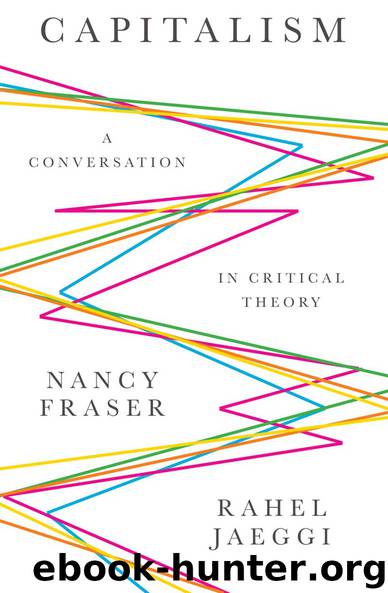Capitalism: A Conversation in Critical Theory by Nancy Fraser & Rahel Jaeggi

Author:Nancy Fraser & Rahel Jaeggi
Language: eng
Format: epub, azw3
ISBN: 9781509525263
Publisher: Wiley
Published: 2018-06-27T22:00:00+00:00
3
Criticizing Capitalism
Ways to criticize capitalism
Jaeggi: We should now turn to the question of what is wrong with capitalism, and, therefore, to the matter of criticizing capitalism. On what grounds is it possible to criticize capitalism? And what kinds of critiques are appropriate for the institutionalized social order that we call capitalism?
There have been various critiques of capitalism for as long as capitalism has existed. But not all critiques are equally insightful, and not every critique is something we would want to endorse. Some claim to be taking aim at capitalism when what they’re really criticizing is modern society; some draw tenuous links to trace everything they find wrong in the world back to capitalism; and some blame capitalism for problems we find in virtually every form of social organization. Some tend to be too nostalgic or have a conservative tenor; some are diffuse or simplistic; and not all of them have aims we would describe as “emancipatory.” Some are downright regressive or even fascist.
So it’s important that we specify our standards of critique and, moreover, that we do so in a way that is tailored to thinking about capitalism. We should have an idea of what exactly we are criticizing when we take up a viewpoint on what is undesirable about our global capitalist order. We can agree there is something problematic about capitalism and the way our societies are organized, but it is not always obvious when a particular malady in the world can be traced back to it specifically.
Fraser: Agreed. We don’t want to trace every conceivable social ill to some all-powerful, but under-specified thing called “capitalism.” That would turn the concept into a catch-all, another “black box,” as it were. Nor do we want to imply that the solution is to return to a supposedly pristine precapitalist way of life. But that still leaves open many possible paths for developing critique. How exactly do you want to proceed?
Jaeggi: I always liked the way Philippe Van Parijs framed the question in the 1980s: What, if anything, is intrinsically wrong with capitalism?1 What is it we find fundamentally problematic about it, which is not just a side-effect or a chance particularity, but which occurs systematically in conjunction with capitalism? If what we are looking at – the object of our critique – is something that happens in all conceivable societies, or if it is something that happens just incidentally in capitalist society, then it is not really a critique of capitalism. If something in the social systems we’re considering is supposed to be wrong or problematic, is it in fact capitalism that is to blame, or is it something else?
I suggest we begin by distinguishing three models of argumentation or three strategies of critique: a functionalist critique, a moral critique, and an ethical critique. The functionalist argumentative strategy holds that capitalism is intrinsically dysfunctional and crisis-prone; the moral or justice-oriented mode of argument asserts that capitalism is morally wrong, unjust, or based on exploitation; finally, the ethical critique contends that a life shaped by capitalism is a bad, impoverished, meaningless, or alienated life.
Download
Capitalism: A Conversation in Critical Theory by Nancy Fraser & Rahel Jaeggi.azw3
This site does not store any files on its server. We only index and link to content provided by other sites. Please contact the content providers to delete copyright contents if any and email us, we'll remove relevant links or contents immediately.
International Integration of the Brazilian Economy by Elias C. Grivoyannis(109971)
The Radium Girls by Kate Moore(12017)
Turbulence by E. J. Noyes(8040)
Nudge - Improving Decisions about Health, Wealth, and Happiness by Thaler Sunstein(7690)
The Black Swan by Nassim Nicholas Taleb(7106)
Rich Dad Poor Dad by Robert T. Kiyosaki(6607)
Pioneering Portfolio Management by David F. Swensen(6288)
Man-made Catastrophes and Risk Information Concealment by Dmitry Chernov & Didier Sornette(6005)
Zero to One by Peter Thiel(5786)
Secrecy World by Jake Bernstein(4741)
Millionaire: The Philanderer, Gambler, and Duelist Who Invented Modern Finance by Janet Gleeson(4465)
The Age of Surveillance Capitalism by Shoshana Zuboff(4275)
Skin in the Game by Nassim Nicholas Taleb(4237)
The Money Culture by Michael Lewis(4198)
Bullshit Jobs by David Graeber(4179)
Skin in the Game: Hidden Asymmetries in Daily Life by Nassim Nicholas Taleb(3989)
The Dhandho Investor by Mohnish Pabrai(3758)
The Wisdom of Finance by Mihir Desai(3732)
Blockchain Basics by Daniel Drescher(3574)
